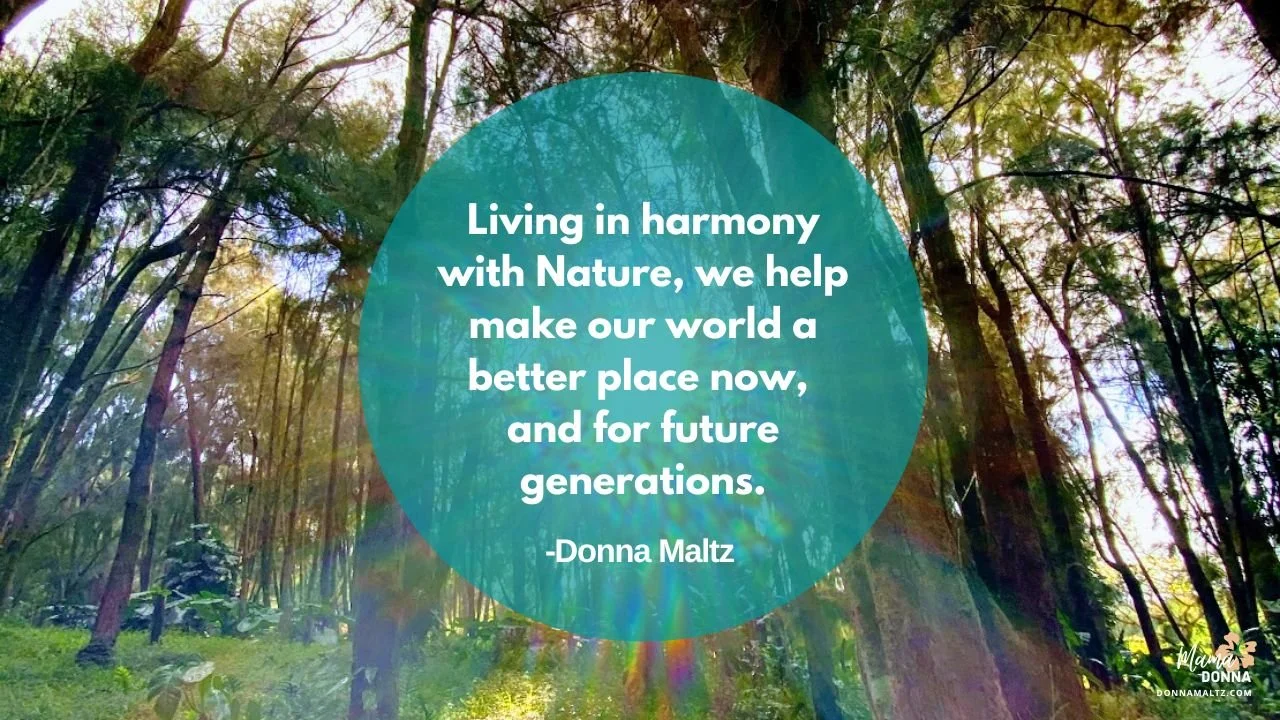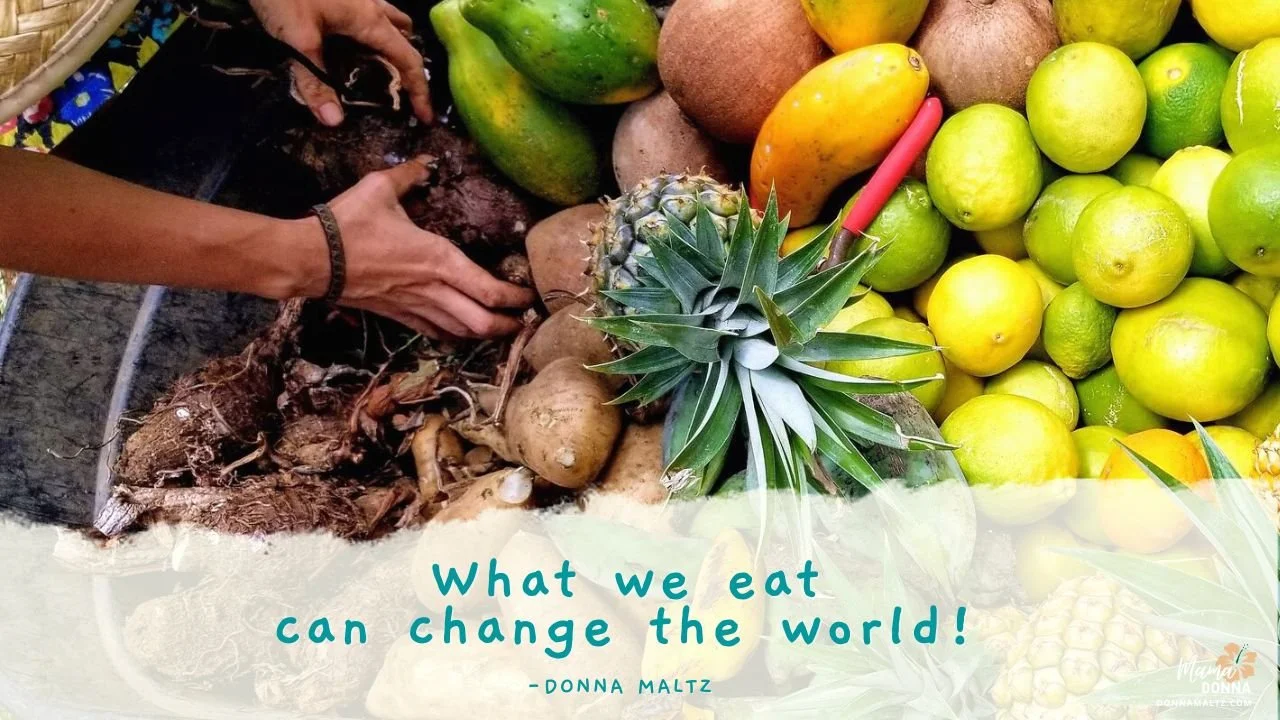Regenerative Living to Heal and Heal the Planet: What Does it Mean?
Soulutions, not solutions. A SOULution is solving problems with long-term benefits for all lifekind which ensures a better world for future generations. Another way to understand the difference between sustainable and regenerative is when we are sick, to get well, we take extra supplements and nourishing foods to regenerate our cells - body, mind, and spirit. If we sustain an unhealthy diet and lifestyle, we can not regenerate/restore/renew/revive enough to fully overcome an illness. Mother Earth is sick and needs our cooperation and help.
You have been hearing a lot of buzzwords such as "green," "sustainable," or "regenerative" living. The truth is that these are more than just buzzwords. Sustainable living and green living are interchangeable concepts, which both mean living a lifestyle that does not harm the environment but encourages health and stability.
For the last few hundred years, we have been living unsustainably, meaning that we are using the earth's resources faster than the earth can produce them, and many of these resources can't come back once they've been used. These days it is not enough to be sustainable. We must regenerate our planet for it to be sustainable.
Due to this, we're creating a world where Nature is being devoured and thrown out of balance. Fortunately, we can turn things around by changing our habits and our lifestyles from those of constant consumption to those more conscientious about the safety and health of Mother Earth. We must work on SOULutions, not solutions.
Sustainable Living:
Sustainable living is a lifestyle that strives to reduce one's carbon footprint. This simply means living in a way that preserves instead of consuming the earth's natural resources and preserves their own personal resources.
The point of sustainable living is to break the cycle of overconsumption seen throughout the world. So many people commonly consume until nothing is left when they should be learning to conserve their resources to make them last longer and share them.
Regenerative Living:
In addition to reducing our carbon footprint, we must contribute to the planet's well-being. We do this by contributing more than we take. Planting trees, gardens, large-scale regenerative agriculture, upcycling clothing and all textile, and restoring waterways, to mention a few, are vital that we all start thinking and acting "regenerative living" because "sustainable living" isn't enough. We can no longer sustain the current status quo of our planet if we are to leave our world better for the future generation. For that, we can't just sustain. We must regenerate.
Regeneration happens when there is balance. Regenerative living creates a rhythmic cycle that makes the planet and all lifekind more resilient. It stimulates biodiversity by giving every piece of the ecosystem the fuel and foundation necessary to flourish. In addition to consuming less, implementing regenerative farming practices, and repurposing everything possible, we must educate our children, municipalities, faith communities, small and larger businesses, and basically everyone to have a habitable planet. We must aim for a regenerative lifestyle and career when it comes to changing the world and changing ourselves for the better.
Living a regenerative lifestyle can be done by making minor changes to your everyday life that will benefit the environment and your health. Think living with the systems and cycles of Nature.
Ways To Live a more Regenerative Lifestyle
Try these simple lifestyle changes to integrate "regenerative" habits into your everyday routine.
Organic and Local Eating:
One of the most straightforward changes you can make is to switch the way you shop and eat. Considering everyone eats, imagine if everyone switched to a regenerative diet and the impact that could have on regenerating our soils, waterways, the air, bodies... well, everything.
Pay the farmers now or the Big Pharma later.
Some say that organic eating can be expensive, and while this can be true, it doesn't have to be. Organic Soil consistently shows higher levels of nitrogen, carbon, and organic matter, which is better for people and the planet. Modern industrial agriculture robs the Soil of its natural nutrients. Dead Soil is dirt. By purchasing organic food and shopping at farmers' markets from the regenerative farmer, you help build better Soil and reduce the use of chemicals in our food one bite at a time.
There is plenty of reason to believe the news that food shortages are here and only going to be further compromised as the climate crisis accelerates. Everyone must be mindful, nurture our food system, conserve water and power, and consume less.
Gardens NOT Lawns:
Want to save money, live healthier and contribute to sequestering carbon? Consider growing your own herbs and veggies and composting your food waste to help nourish the Soil.
Many people have taken to planting their own fruit and vegetable gardens and housing chickens for fresh eggs and meat. This option takes some time and money to get started, but once you've got things going, it's easy and inexpensive to maintain. The health benefits for you and the planet are more significant than the expenses. Think permaculture design wherever you see a lawn. Permaculture is a regenerative land management and settlement design approach that adopts arrangements observed in flourishing natural ecosystems.
Be Mindful of Your Water Usage:
In addition to reducing showers and abstaining from flushing the toilet (when it's yellow, it's mellow, when it's brown, flush it down), there are other ways to preserve water. Shut off the water while brushing your teeth and washing your face, and water your gardens in the evening when it's cooler, and there's a higher chance of all the water absorbing into the Soil.
Be a One LightBulb Household:
Turn off the lights when you leave the room. An easy way to conserve energy is to turn off lights and unplug appliances when you are not using them. Unplug everything you are not using. When plugged in, whether it is a cell phone or a toaster, it all draws energy. If you typically leave lamps or the television on when you're not in a room, train yourself to always turn these things off when you plan to vacate a room for an extended time. A quick run to the bathroom doesn't require shutting off all lights and power, but if you're in your bedroom and decide to spend some time in the backyard, don't leave things up and running.
Walk/Ride More:
If you typically drive a lot and would like to reduce your carbon footprint, reduce your car's use. Instead, take walks or ride a bike, skateboard, scooter, or even rollerblade to your destination. If you're unable to give up driving, maybe invest in a "green" vehicle that uses less gas and doesn't produce toxic emissions.
Use Fewer Resources:
This means being wise about how much you use and understanding how much you can save. For example, when it comes to food, eat smaller portions and learn to enjoy leftovers. Similarly, things like toothpaste, paper plates, paper towels, body wash, lotions, and much more can be used quickly. It all comes back to the consumer-using more than is necessary by not thinking ahead. Instead, look at these things practically and do what you can to make them last. Use the smallest amount of toothpaste required to clean your teeth, stick to a dime-sized amount of body wash or shampoo in the shower, and don't overuse paper plates and paper towels just because.
We often use things quickly without regard to preservation because we know we can always get more. Just because the laundry detergent says to use this much does not mean you have to. I use 1/2 as direct and add 1/4 cup of baking soda to each load, and my clothes are super clean and cost less to clean while being easier on the environment. When possible dry your clothes on a clothesline, inside or outside.
These days the unsustainable fast pace lifestyle has most people burning the candle at both ends. Get out of the mindset that running out for a midnight snack is ok. If we're running low on shaving cream, there's a market down the street. Need food? There are plenty of restaurants all over. While this is technically true, it does not mean that these things will always be there. And do we really need them?
Things can change, and problems can arise, making it essential to prepare for the unforeseen by living smart.
Regenerative clothing is not a fad but a necessity for being part of the SOULution. The concept of repurposing fabric and upcycle garments keeps millions of pounds of perfectly good clothing out of the dump. Support upcycle designers and companies, shop at yard sales and thrift stores, and be proud of your purchase. Start your own trash to treasure business and earn a good living while reducing waste.
Upcycle Everything:
Turn glass bottles into garden trail glass, old wool sweaters into felt stuffed animals, old silverware into jewelry, adding a little TLC to a beat-up dresser by turning it into a work of art with some paint and classy knobs from another unrepairable dresser. Salvage whatever you can and turn your imagination into a fun hobby or business. Rather than buying something from a box store that imports things from China, often made by underpaid humans forced to work in poor working conditions, get creative. Supporting people's rights is as key to regeneration as nourishing the planet.
Unity in Community Builds Our Immunity:
Nourishing the planet and our souls... Like I always say, from the Soil to the Soul, we must live like the future matters. The fastest and most fun way to regenerate our health and the planet is to build community. Interconnected, intergenerational, respect that values all specials, all lifekind. Planning out developments that connect humanity to the systems and cycle of Nature is the way to a healthier you and planet.
Hug yourself and trees often and feel the connection.
Get together with your local municipalities and businesses and demand regenerative action today. Be part of the change, and you will naturally be regenerated, renewed, and feel better about taking up space on this beautiful blue marble we call Mother Earth.
Remember to regenerate yourself daily. Rest, relax, and rejuvenate by treating yourself with kindness, nourishment, love, and respect. Get out into Nature. The closer you get to Nature, the closer you get to your true Nature. The healthier you are, the more you can contribute to the regenerative process.
To earn more about how to regenerate yourself and the planet, enjoy my books. And, be sure to tune into this weeks’ featured guest Jae Sabol from One Community and learn the ins and outs of regeneration from a master permaculturalist, community builder expert. ♥️🌎
PS: 🌴 Help Save Mother Earth by purchasing my Nature Photography.
All proceeds go to preserve Nature 🍃🌿
Join our Soil to Soul De-stress and Thrive Membership 🌈
Our tribe is so excited to help you de-stress, manifest success and savings, and start living and working like the future matters!
If you feel burnt out, stressed, or overwhelmed, and wish to save money, improve your health, and heal the planet, then check this out!
Get all the details here: bit.ly/soil2soulmembership
Take advantage of the best price the membership will ever be! Become a founding member for only $15. Save 85% and get all of the perks of our $97 membership level for the first month, and start to live your most healthiest life!
The Benefits are EPIC!
It's positively fun, educational, and uplifting 💕
From the kitchen to the forest, we will explore ways to build our immune systems, strengthen our relationships with ourselves and others, connect with Nature, and dive into our purposeful passions.
🥰 A Dose of Positivity
Want more tips and resources to rebalance your health and Mother Earth?
Join our Facebook Group, Holistic Health Nature Therapy: Live and Work like the Future Matters.
Engage and share your SOULutions 💕
Need some Mama Donna love? 🥰
Book a free discovery call ✨














